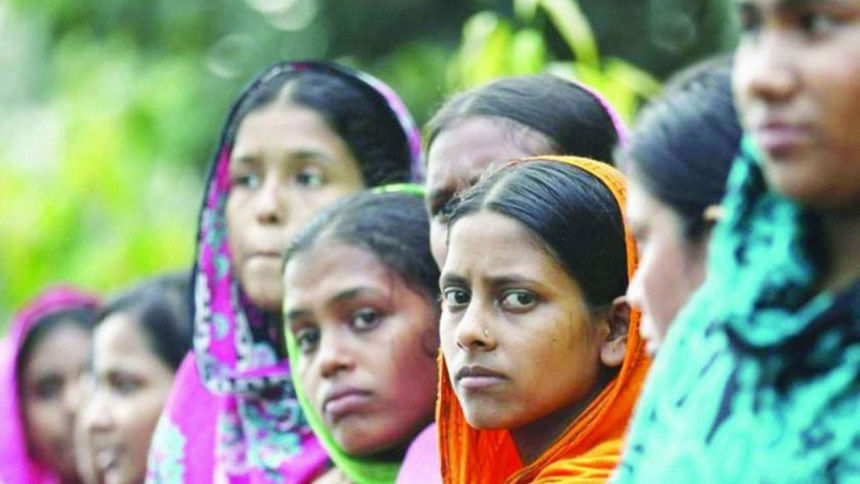From gender inequality to climate change

As Bangladesh looks forward to its next 50 years, there remain significant human development challenges for the country. Some of these challenges are lingering challenges, like poverty and gender inequality; some are deepening challenges, like inequalities and climate change; but some are, undoubtedly, emerging challenges, like human security and the Covid-19 pandemic. The global scenario also impacts human development challenges for Bangladesh, which require different strategies and institutions.
As of 2019, around 34 million people were still in income poverty in Bangladesh. More than one in every four children are stunted and more than one in every five children are underweight. In Bangladesh, in 2018, there was one doctor for every 2,000 people, one nurse for every 2,500 people, and one hospital bed for every 1,250 people. About 45 percent of people were without safely managed drinking water services in 2019 and 22 percent were without electricity. More than half of those who have jobs are in vulnerable employment.
Over the years, Bangladesh has been able to quantitatively expand its basic social services. Yet, the quality of such services has remained a lingering concern. This is especially true of health and educational services. For example, in the health sector, there are three-tier service systems—public services (geared towards common people), private services (meant for the middle and upper-middle classes), and services beyond the borders (availed by the richest class). Even though there have been expansions in terms of quantity, public health services are severely deprived of resources and facilities and, as a result, poor and marginalised people do not get quality services. This means that expansions of services have been achieved with qualitative compromises.
Bangladesh has a working age young population of nearly 30 million, but only 30 percent of the total employed people in Bangladesh are young people. Given the current situation and the projected demographic dividend till 2030, ensuring jobs for people, particularly for young people, remains a lingering challenge. Furthermore, as the content and the organisation of jobs are rapidly changing, getting our young people ready for a globalised digital 21st century economy is a huge task.
Over the years, even though remarkable progress has been made in the area of women's empowerment, women still face several deprivations—often just because of their sex. About 60 percent of women in the age group of 20-24 years get married at age 18. About 58 percent of women face domestic violence by their intimate partners. Furthermore, for every 100 unemployed male youth, there are 150 unemployed female youth. Of the STEM (Science, Technology, Engineering and Mathematics) graduates, only eight percent are women. One in every three women do not have access to financial institutions with mobile banking services. Therefore, women's empowerment remains a lingering human development challenge for Bangladesh.
Inequality has become the defining issue of Bangladeshi society and as such, has become a deepening challenge. In Bangladesh, the Gini index of income, a measure of income inequality, has increased from 0.39 in the early 1990s to 0.48 in 2016, suggesting an increasingly uneven income distribution over time. But the inequalities have also expanded in non-income areas, such as health, education, ownership of natural resources, etc. Furthermore, there are inequalities not only in terms of outcomes, but also in terms of opportunities—in health and education, as well as in productive resources, such as credit.
Another deepening challenge for Bangladesh is climate change. Climate change-induced extreme weather events are estimated to have caused an estimated yearly loss of GDP of USD 1.7 billion. Loss of arable lands and livelihoods, displacement of people, loss of agricultural production and food insecurity are caused by an increased frequency and intensity of various natural disasters, induced by climate change. Indeed, climate change affects physical and social environments, knowledge, assets, etc. For example, in salinity- and drought-prone areas, there are significant deprivations of drinking water, which may lead to serious health issues for the population. Access to resources, capabilities and opportunities intensify the risks. In the ultimate analysis, climate change is not only an environmental challenge, but it has become a deepening human development challenge for Bangladesh.
Over the years, the governance and the institutional structure of Bangladesh have been suffering on three fronts—inefficiency and ineffectiveness, corruption and leakages, and lack of transparency and accountability. The quality of governance depends on issues like rule of law, the oversight function, judicial independence, meritocracy-based appointments and promotions of public officials, transparency and accountability. Concerns have been raised in these areas as human development challenges deepen for Bangladesh.
Just like any other country, the Covid-19 pandemic is posing as an unprecedented emerging human development crisis for Bangladesh. It may erode the human development gains that the country has made over the past years. Notwithstanding the almost 34 million people already living in poverty in Bangladesh, Covid-19 (through its economic repercussions) may push another 30 million people into poverty. The country may also lose a total of 1.1 million to 1.6 million jobs for the youth, depending on the containment of the virus. As of June 2020, a total of 70,000 workers lost their jobs in the garments industry of Bangladesh. Covid-19 has already exposed the fragility of the health system, which may become more vulnerable in the coming days. Information technology-based education may generate more inequalities as children from rural areas or from poor households will not have access to this technology. Covid-19 will also have asymmetrical impacts on women in terms of their formal work in the economy as well as on the burden of their household and care work. It may lead to more friction and domestic violence because of lockdowns. All this is bound to have serious implications on the mental health of people.
In recent times, issues of democratic space, people's participation, intolerance and violence in society have been identified as emerging threats to human development in Bangladesh. All these have serious impacts on people's security. The affluence, wealth and power biases of the system have made the situation worse. In many instances, terror has become our culture and violence our language.
The global economic system has become more fragile and inward-looking because of the Covid-19 pandemic. As the economic growth of the rest of the world (including of developed countries) slows down, Bangladesh may be adversely affected in three ways. First, the demands for its garments, and its unskilled workers in the Middle East, may decline. Secondly, there may be impositions of non-tariff trade restrictions by the developed world and finally, there will be fewer opportunities for concessional aids or grants. All these will reduce the resources available for human development in Bangladesh. Addressing the human development challenges of Bangladesh—whether lingering, deepening or emerging—will require both policy actions and institutional reforms.
Selim Jahan is Former Director, Human Development Report Office and Poverty Division, UNDP

 For all latest news, follow The Daily Star's Google News channel.
For all latest news, follow The Daily Star's Google News channel. 



Comments